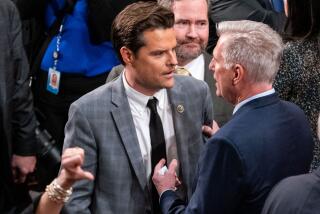Chapman Hosts an Old Anti-War Horse
- Share via
Former Minnesota Sen. Eugene J. McCarthy, the national conscience of the Vietnam War in the late 1960s, Monday was talking to about 400 students at Chapman College in Orange about tanks in Bulgaria.
Now, one might wonder how Bulgarian tanks entered into the historical perspective on Vietnam he was giving to students gathered in the college’s auditorium for the Freshman Seminar Program.
He explained it had to do with numbers.
McCarthy, 71, said that he first became wary of numbers such as “body counts” and “kill ratios” later used to quantify the Vietnam War when former President Lyndon B. Johnson’s Secretary of Defense Robert McNamara was asked during a Senate committee hearing how many tanks were in Latin America. Without a moment’s hesitation, McNamara said there were 964--exactly.
“Then, without another question from anyone, he added that that is 60% as many tanks as the single country of Bulgaria has,” said McCarthy, shaking his head in wonderment as his audience began to laugh. “And it’s probably not the high point of my Senate career, but I ask, ‘Why Bulgaria? Do you count tanks relative to Bulgaria? Is there a “Bulgarian absolute” relative to tanks?”’
McCarthy grew more amused as he told the students, “And he said, ‘If there were, I would tell you about it.’ I resolved then that I wasn’t asking any more questions.”
But McCarthy did ask more questions. In 1967, alarmed about the country’s growing involvement in Vietnam, he challenged Johnson in the Democratic primary. Johnson eventually withdrew from the race--virtually amounting to a resignation--and his vice president, Hubert H. Humphrey, went on to lose to Richard M. Nixon in the 1968 presidential election.
By then, McCarthy had galvanized the anti-war movement and become a symbol of the moral outrage that led to the eventual withdrawal of American troops in 1973.
The white-haired McCarthy has aged since then, as have the young people who protested with him against the war. Several hundred of that generation’s children were gathered Monday in Chapman auditorium to learn about the Vietnam War much the way their parents had learned about World War II. As part of the program, they will hear Nov. 11 the opposing view from Norman Podhoretz, author of “Why We Were in Vietnam.”
As McCarthy met with the students Monday, he displayed his wry sense of humor and intellectual clarity. Since he ended his 22-year career in the Senate in 1970, he has written books and poetry, lectured and taught university courses in politics, literature and history.
As he told the students in the Freshmen Seminar Program, after a respectful introduction by a college administrator, “There was a time when I didn’t need an introduction.” Now, he said, some of those who do manage to recognize him mix him up with that other famous McCarthy, the anti-communist Joe of the 1950s.
Speaking with reporters before the lecture, McCarthy said he did not think that Nicaragua was the country’s next Vietnam, partly because of the lessons learned in Southeast Asia and partly because Nicaragua does not back up into a communist country as Vietnam did to China.
As for the decline in student protest, McCarthy said it was easier for students in the ‘60s and ‘70s to protest against a Vietnam than for students of today to protest against something as amorphous as “militarism.”
Later, after walking across the tree-lined campus to talk with students in the constitutional rights class, McCarthy said he thought military conscription should be restored. A volunteer Army “is going to insulate the war from general social criticism such as you get when you draft people,” he said.
As for the lessons of Vietnam, McCarthy said they were twofold. First, he did not think that the country could get drawn into another war such as Vietnam. And secondly, it resulted in the 18-year-old vote.
“The fact they don’t vote now doesn’t make that much difference,” McCarthy said. “But to have that kind of vote when you need it, it’s important.”
More to Read
Sign up for Essential California
The most important California stories and recommendations in your inbox every morning.
You may occasionally receive promotional content from the Los Angeles Times.













